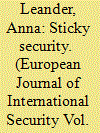| Srl | Item |
| 1 |
ID:
155814


|
|
|
|
|
| Summary/Abstract |
The King Abdullah II Special Operations Training Center (KASOTC) was financed and established by the US Department of Defense, is operated by a US private business, and is owned by the Jordanian army. It not only offers a base for the training of international Special Forces and Jordanian border guards, but also for military adventure holidays, corporate leadership programs, and stunt training for actors. This article provides an analysis of the processes and technologies involved in US–Jordanian military collaboration by investigating some of the ways in which war is simulated, marketed, and played at KASOTC. Particular focus is paid to the stark biopolitical judgments about the different worth of human subjects and their role in intersecting processes of militarization and commercialization. The article argues that US–Jordanian military collaboration at KASOTC is marked by the simultaneous blurring and reinforcement of boundaries, as commercial security is moralized and imagined moral hierarchies marketized. While war at KASOTC is an interactive and consumable event for some, it engenders deadly realities for others. The article is an empirically-grounded contribution to critical security studies based on interviews and observations made during a visit to KASOTC in early 2013.
|
|
|
|
|
|
|
|
|
|
|
|
|
|
|
|
| 2 |
ID:
169163


|
|
|
|
|
| Summary/Abstract |
In security studies and beyond, technological developments are associated with technocratic, rationalistic, transparent forms of security governed from a distance. In much of the advertising of tracking devices the associations made are very different not to say opposed to this. The advertising composes security anchored in sensemaking and resonance rather than calculus and reason, working from within and below rather than from a above at distance and depending on the negotiation of opaque co-presences rather than the establishment of precision and transparency. The consequence is that advertising not only extends but also deepens the grip of military/security matters: making them sticky. Moreover, the heterogeneity of the elements is such that what is composed is a shifting collage rather than a stable composition. This argument makes a threefold contribution to security studies: a theoretical reconceptualisation of what it means to compose security, an empirical intervention in the debates surrounding the politics of tracking devices and a methodological intervention in favour of collaborationist research strategies.
|
|
|
|
|
|
|
|
|
|
|
|
|
|
|
|